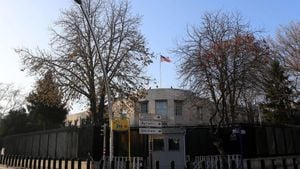Recent developments surrounding federal investigations and settlements have painted a vivid picture of financial regulations, civil rights abuses, and the fallout from corporate misconduct. These narratives draw on the intricacies of policies imposed on financial institutions, police accountability, and the responsibilities of companies entangled in the opioid crisis.
On one front, several banks and banking trade groups have found themselves embroiled in legal battles against the Consumer Financial Protection Bureau (CFPB). This fight centers around the bureau's finalized rule aimed at capping the overdraft fees banks can impose on consumers. Announced on Thursday, the rule is part of President Joe Biden's broader initiative aimed at reducing so-called "junk fees" across various consumer services. For banks, the stakes are high as they argue the new regulations could push desperate consumers toward unregulated borrowing options.
Under the recently established guidelines, financial institutions will have three options moving forward. They can either levy a flat $5 overdraft fee, impose charges based solely on their actual cost and loss, or charge any fee as long as they clearly disclose the terms akin to any other loan, such as how it would be reflected as an Annual Percentage Rate (APR). Despite the reductions companies have already made to overdraft fees over the past decade, these fees still rake in around $8 billion annually for the biggest banks. This places considerable pressure on the CFPB, which oversees banks and credit unions with assets exceeding $10 billion.
Leading the charge against the CFPB is the Consumer Bankers Association, which contends the bureau has overstepped its regulatory mandate. CBA President Lindsey Johnson stated, "Research shows overdraft services provide much-needed liquidity during short-term budget shortfalls so consumers can put food on the table, keep the lights on, and make other important payments on time." Following the publication of the new rule, the lawsuit has already been filed before the U.S. District Court for the Southern District of Mississippi, seeking to halt its implementation until the court reaches its final verdict on the matter.
Meanwhile, the Justice Department has launched serious investigations on law enforcement practices, exemplified by its findings on the Mount Vernon Police Department. After delving deep over three years, investigators accused the department of engaging in civil rights violations, including excessive force, arbitrary arrests, and unlawful strip searches. This scrutiny led the department to be branded as functioning outside the bounds established by both the U.S. Constitution and federal law.
The investigation's report revealed alarming practices, including the disruptive arrest of two elderly women accused of conducting what officials thought was a drug transaction. After performing unwarranted strip searches at the police station with no evidence found, the department's conduct was criticized for both its methods and the blatant abuse of power. The report highlighted inadequate training and oversight within the department, tying back to the general issue of police accountability heralded by the Justice Department.
Mount Vernon’s Mayor Shawyn Patterson-Howard acknowledged these findings but reassured citizens her administration would cooperate with the Department of Justice to resolve the outlined issues. The mayor emphasized, "We have never run from this issue. We wholeheartedly support our good officers and at the same time will not tolerate and will punish unconstitutional policing." Justice Department officials also noted some early attempts from the city to initiate changes, yet more comprehensive action remains necessary to address the root of these issues. The report underscored the department should roll out new policies and enhanced training to reinforce lawful practices.
Adding another layer to the federal settlement saga, McKinsey & Company has recently agreed to pay $650 million as part of the resolve over its role with Purdue Pharma amid the country's widespread opioid crisis. Court papers attached to the case indicate this could be just the beginning, as the consulting giant has faced mounting pressure since stepping become involved with Purdue’s aggressive marketing tactics for its opioid products.
The settlement also includes entering a deferred prosecution agreement related to criminal charges of conspiring to misbrand prescription medications. The fallout extends beyond merely financial penalties. A former high-ranking executive at McKinsey has also pledged guilty to obstruction of justice, laying bare the extent of misconduct linked to the opioid epidemic. Between settlements with state and local governments, McKinsey has already discussed payments totaling over $765 million, showcasing the hard-hitting impact of the crisis on the company.
The opioid epidemic itself has resulted in grave loss of life, with over 80,000 deaths recorded linked directly to the crisis. Purdue Pharma's OxyContin has frequently been cited as a catalyst, hitting shelves back in 1996. This begins a long saga where prescription drug misuse escalated, leading to the current concerns involving street drugs like fentanyl. The company's previous admissions of guilt—culminated by its plea deal wherein it incurred over $8 billion penalties—highlight the grim reality these institutions now face as they attempt to navigate accountability amid devastating public health consequences.
Also making headlines, the Justice Department's Inspector General recently released findings related to the claims of FBI involvement during the January 6 Capitol incident. Drawing from comprehensive reports, the Inspector General concluded there was no evidence indicating undercover FBI agents acted to incite the violence seen during the protest. Findings revealed no undercover agents were present amid the Capitol storming; instead, some confidential human sources did function as informants during the event.
The report did not hold back on the coordination issues, indicating significant lapses likely influenced the FBI’s preparation for the chaotic events of January 6. Even with 26 confidential sources reportedly present, none encouraged illegal activities, and the entire situation raised questions about how effectively intelligence was gathered leading up to the incident. Describing the findings as directly contradicting claims of infiltration, the report stated, "We found no evidence... showing or suggestive of the FBI having undercover employees in various protest crowds, or at the Capitol, on January 6."
Such scrutiny continues as over 1500 individuals face charges related to the Capitol breach, marking another chapter of accountability following 2021's insurrection. Those involved will likely continue to reckon with the legal repercussions tied to this politically and socially significant event for years to come.
Tied together, these stories highlight the multifaceted discussions taking place around federal investigations and settlements. They indicate not just the weight of accountability but also intersecting societal issues where consumer rights, police reform, and corporate responsibility blend within the broader narrative of governance and justice. The legal outcomes from these investigations will set precedents for how financial institutions operate, how law enforcement ensures civil rights protections, and how corporations navigate the complex web of compliance and ethics going forward.



